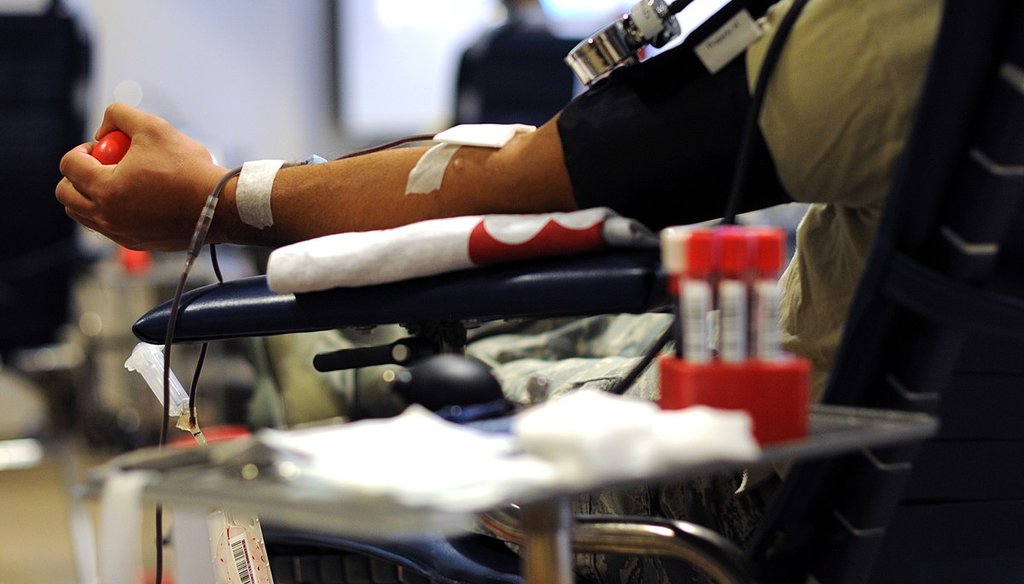Get PolitiFact in your inbox.

A member of the New Jersey Air National Guard squeezes an object while giving blood in Atlantic City, N.J., in 2015. (AP)
If Your Time is short
- If you know who manufactured your vaccine, such as Pfizer, and feel healthy and have no symptoms, you can give blood immediately after receiving a COVID-19 vaccine.
- If you don’t know who manufactured your vaccine, you must wait two weeks after the date you receive to make a blood donation.
Recently the American Red Cross has fielded questions from concerned potential blood donors uncertain if they can give blood after receiving a COVID-19 vaccine. But the answer is pretty straight-forward: Yes, with one small caveat.
You need to know the name of the company that manufactured your vaccine, such as Pfizer, Moderna, or Johnson & Johnson. If you have that information, if you feel healthy, and if you have no symptoms of COVID-19, you can give blood right away; there’s no wait time between when you received the vaccine and when you’re eligible to give blood, according to Dr. Pampee Young, chief medical officer at the American Red Cross.
The Red Cross asks donors for the manufacturer of the COVID-19 vaccine they got to ensure they didn’t receive a vaccine as part of a clinical trial that has not yet been approved by the Food and Drug Administration.
If you don’t know who made your COVID-19 vaccine — or if you were vaccinated as part of a clinical trial testing a vaccine that’s not yet authorized in the United States — you can still give blood. You just have to wait until two weeks after being vaccinated to make a blood donation.
The organization will also require donors to wait before they give blood after receiving a COVID-19 vaccine if they experience side effects such as muscle aches, a headache, or a fever. But once those symptoms go away, it’s okay to give blood.
It’s also safe for individuals to receive transfusions of blood donations from individuals who have received a COVID-19 vaccine, Young said. "Similar to other vaccines such as measles, mumps, or influenza, the COVID-19 vaccine is designed to generate an immune response to help protect an individual from illness, but vaccine components themselves are not found within the blood stream."
For more information on how donors can sign up, the Red Cross posted a video explaining when there’s a deferral period and how donors can sign up.
And the Red Cross is encouraging people to sign up to give blood after low blood donor turnout earlier in April.
"This is concerning, as it could be a potential signal of more serious challenges to come in ensuring there is a sufficient blood supply readily available for patients as donors resume travel, family vacations and other pre-pandemic activities," Young said.
Join PolitiFact LIVE on May 10-13 for a festival of fact-checking with Dr. Anthony Fauci! Register today >>
Our Sources
Email interview with Dr. Pampee Young, chief medical officer, American Red Cross
American Red Cross, Can you donate blood after a COVID-19 vaccination? April 6, 2021




















